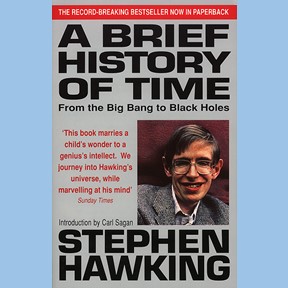
For a man who was given just a few years to live in his twenties, not only did Stephen Hawking beat the odds but also revolutionized physics for next half a century. Let us see what makes his book A brief history of time special and why you should read it.
The cover quite nicely summarizes the book: This book marries a child's wonder to a genius's intellect. The introduction to A brief history of time is written by an equally famous scientist, American astronomer Carl Sagan, who declares Hawking a worthy successor to Newton and Dirac.
Hawking wrote the book for non-specialist readers who have no prior knowledge of physics or astronomy. He clearly possessed a natural teacher's gifts: easy good-natured humour and the ability to illustrate the complexities of physics with well thought out analogies.
As the book progresses, Hawking takes on the role of a narrator, unfolding the stories of man's struggle for knowledge and wisdom.
Hawking briefly touches upon the important contributions made by Copernicus, Kepler and Galileo that debunked the 2000-year-old accepted world views of Aristotelian science.
The consequences were not in their favour as Copernicus was mysteriously put to death for his daring questioning and Galileo imprisoned for life for his very stubborn resistance against the church.
The first scientific movement was crushed by the figures of authority but it paved a way for later scientists like Newton and Huygens. Hence, the famous saying attributed to Newton: If I have seen further, it is by standing on the shoulders of giants.
Throughout the book, Hawking has discussed various integrations in physics as they happened: Newton's laws that explained celestial mechanics, Maxwell's equations unifying the phenomena of electricity and magnetism, Einstein's energy-mass equivalence, wave-particle duality and so on.
Hawking has touched upon his collaboration with mathematician Roger Penrose with whom he worked on deriving a set of results in general relativity which attempt to answer the question of when gravitation produces singularities. With this, Hawking earned his PhD in 1965.
Two chapters are devoted to black holes, Hawking's specialization. In 1970, a young physicist named Jacob Bekenstein made a proposal that the surface area of a black hole's event horizon might be the measure of its entropy.
But if an object has entropy, it must also have a temperature, and if it has temperature, then it must radiate energy. Since the whole point of black hole is that nothing gets out of it, not even light, the idea seemed absurd at first.
While initially Hawking set out to prove Bekenstein wrong, to his surprise, he found that Bekenstein was correct. In doing so, Hawking brought together relativity and quantum mechanics and discovered the formula of black hole radiation.
In the book, there is also a discussion on time in which Hawking argues that intelligent life could not exist in the contracting phase of the universe, that is, when time is running backwards. Only the expanding universe is suitable for the humans to exist, as it contains a strong thermodynamic arrow.
For example: in order to live and function properly, we must consume food – an ordered form of energy and convert it into heat – the disordered form of energy. That clearly points to a thermodynamic arrow of time moving forwards.
All in all, A Brief History of Time is a masterpiece that makes sense because it sold more than 10 million copies and got translated into 30 languages. It is the single best book on physics and astronomy covering a large number of topics on science and philosophy.

In his conclusion to the book, Hawking says: "If we find the answer to why we and the universe exist, it would be the ultimate triumph of human reason, for then we would know the mind of God."
The last line irked his academic colleagues and confused critics since Hawking was known for being an outspoken atheist. Hawking later explained in an interview that he had used the word God only as a metaphor.
This book infuses our questioning and thinking with a spiritual aspect: why there is something rather than nothing? Does the universe need a supernatural creator or is it governed by natural laws? Can time run backwards? How do we know what's true and what's not true?
In A brief history of time, Stephen Hawking tries to unveil answers to questions of such intriguing nature that add to the beauty and mystery of science. His book is not only a source of great learning but also a messenger of science to the wider public.







 Physics, astronomy and science history blog for students
Physics, astronomy and science history blog for students
Responsive Ad Slot